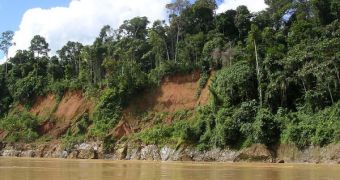A new computer model shows that droughts triggered by global warming will in the future affect the Amazon so hard, that it could cause a widespread drought, which will in turn have devastating consequences on the world. If the rain forest in the Amazon region burns, then the rain patterns throughout the globe will change, including seasons and the times when rain usually falls. All ecosystems will be turned upside down, and failed spawning seasons will mean the downfall of thousands of animal species. And the factor that can trigger all of this is resorted to everyday – fire.
Indeed, farmers and cattle growers are the ones who keep cutting down the forest, in order to expand their lands. But, as they cannot exactly bring down the ancient trees using a mere ax, they burn them to the root and build on top of the remains. The situation in the Eastern Amazon is most alarming, as here changes in the size of the rain forest are registered everyday, and people keep cutting the trees nonetheless, even if it means them having to go against the police and the military.
"Amazonia has survived climate change in the past, and this study shows that it could survive it in the future. The challenge now is to provide Amazonian countries with far greater incentives to keep their rain forests standing, rather than to cut them down, so increasing Amazonia's resilience to see it through the difficult times ahead," Global Canopy Program Director Andrew Mitchell explains.
The thing about the trees is not that they, in themselves, clear the air of carbon dioxide and generate oxygen, but that they also trap and store significant amounts of carbon dioxide, which means that the dangerous greenhouse gas never reaches the atmosphere. However, if a major fire were to light the rain forest, then extremely large and massive amounts of the chemical would be released, alongside additional quantities coming from the burning of the trees themselves.
Over the last couple of years, authorities in most countries sharing the rain forest have met with global leaders in order to come to an agreement on how richer nations can subsidize poorer countries, so that the latter could stop their farmers from cutting down significant portions of this essential forest. Thus far, this effort has had little success, with countries continuing to bicker over politics, instead of helping out with the environment.

 14 DAY TRIAL //
14 DAY TRIAL //